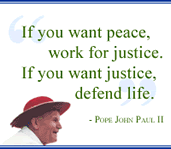Last week we sent out an invitation to the Conference’s 11th annual Catholic Advocacy Day coming up January 29, 2015. The email invited “Advocacy Network members, parish groups, Catholic schools and other interested individuals to join in advocating for respect life, family, education and social justice issues. “
In short order we received a one-sentence email reply from a network member telling us, “You lost me at ‘social justice.’” It was a troubling email since working for “social justice” – that is, as the Church has always defined that term – is fundamental to its Gospel mission.
The Catechism of the Catholic Church describes social justice this way: “Society ensures social justice when it provides the conditions that allow associations or individuals to obtain what is their due, according to their nature and their vocation. Social justice is linked to the common good and the exercise of authority.” (CCC #1928)
Contrary to what one may hear from American media and political talking heads on both sides, the Catholic definition of “social justice” is not code for wealth redistribution or an ever-burgeoning government welfare state. In fact, both Pope Leo XIII in Rerum Novarum and Pope St. John Paul II in Centesimus Annus rejected socialism, communism, and other collectivist political regimes as incompatible with the human person, inasmuch as they “deprive the person of his foundation, and consequently leads to a reorganization of the social order without reference to the person’s dignity and responsibility.” Social justice also does not mean upholding human actions that are contrary to natural law, the inherent dignity of all human beings at every stage of life, and the proper ordering of the human family.
How does the Church define social justice? It is when society recognizes the human dignity of all, equality of all people with differences in abilities, and solidarity among all humankind. The catechism, for instance, states clearly that Catholics must care for the poor and work for the common good. Citing the equality we share with each other by virtue of our humanity, the Church nonetheless points out the difference in distribution of “talents.” “These differences belong to God’s plan, who wills that each receive what he needs from others, and that those endowed with particular ‘talents’ share the benefits with those who need them. These differences encourage and often oblige persons to practice generosity, kindness, and sharing of goods; they foster the mutual enrichment of cultures.” (CCC #1937)
Because the Catholic Church defines social justice as actions that recognize the fundamental dignity and worth of every person, from conception until natural death, when we engage in the spiritual and corporal works of mercy, we are working for social justice. When we defend the rights of the unborn, the disabled and the elderly, we are working for social justice. When we defend God’s plan for marriage, we are working for social justice. When we advocate for the dignity of work, good jobs, and just wages, we are working for social justice. These actions promote the common good and are in and of themselves social justice. As Pope Francis said in Evangelii Gaudium, “None of us can think we are exempt from concerns for the poor and for social justice.”
Many have sought to affix political labels to Catholic social teaching, but Catholic doctrine is just that: Catholic. As members of Christ’s Church we are called to be promoters of social justice by living out our faith in the public square.
